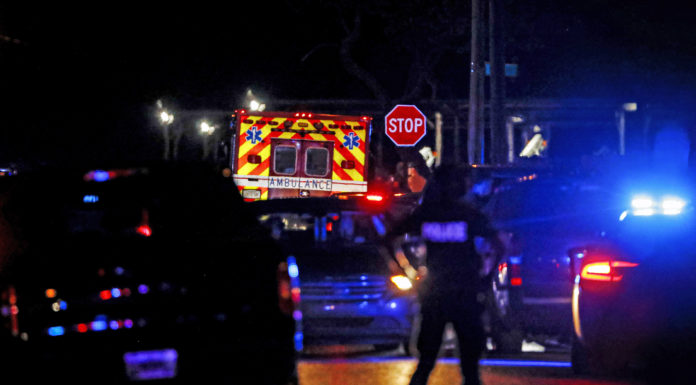(By Casey Harper, The Center Square) A rise in crime, looting and unhindered theft around the U.S. has helped fuel Americans’ rising concerns about crime. Some of the nation’s largest cities are experiencing crime waves in recent years, and new polling shows Americans are worried.
Gallup released new polling Tuesday showing that more Americans are concerned about higher crime with Americans ranking it as the sixth largest problem facing the nation, behind other issues like “poor leadership” and inflation.
“Democrats’ mentions of crime or violence nearly doubled from 5% in March to 11% in April,” Gallup said. “By contrast, Republicans’ and independents’ views were steady, with Republicans holding at 4%-5% and independents at 2%-4%.”
That rise in concern coincides with a string of viral crime spree moments. In Chicago last month, videos of teenagers running through the streets, looting and attacking bystanders went viral. The city’s new mayor-elect, Brandon Johnson, replacing outgoing long-time mayor Lori Lightfoot, spoke out saying that “demonizing” the teens is wrong.
“We have to keep them safe too,” he said.
Those comments drew backlash for the new mayor of Chicago, a city that saw a major spike in crime last year. According to the Chicago Police Department’s end-of-year report for 2022, in the last four years, murder has risen 20% and motor vehicle theft has risen 114%. While some crimes like burglary saw a drop of 35% in that time, crime in the city overall is up 19%.
National police groups point to the lack of support local departments receive in light of several recent high-profile police shootings like the death of Michael Brown or George Floyd. Police in many areas have pulled back, fearing a close call will make then a national villain in what is often called the “Ferguson effect.”
The groups also point to liberal District Attorneys that have arisen in many of the nation’s largest cities who are lax on prosecuting many crimes and in some cases don’t prosecute them at all.
“This is a direct byproduct of an utter breakdown in the criminal justice system. Across the country, we have prosecutors who refuse to prosecute and police who aren’t allowed to police,” Jason Johnson, president of the Law Enforcement Legal Defense Fund, told The Center Square. “The justice system isn’t a revolving door, it’s a merry-go-round. The situation is especially demoralizing and debilitating for law enforcement who have a front row seat to the chaos and misery that has been unleashed.”
Critics have also pointed to liberal bail reform policies which. make it easier for criminals to quickly get back on the streets. Last week, New York leaders once again discussed changes to their bail laws. Four years ago, New York rolled back bail requirements for a range of even very serious offenses, releasing violent criminals back on the streets quickly and sparking backlash.
“The police are just one component of the broader criminal justice system,” Laura Cooper, executive director of the Major Cities Chiefs Association, told The Center Square. “Issues such as bail reform and juvenile accountability are two driving factors and MCCA members have countless examples of repeat offenders cycling through the criminal justice system at a high rate and without consequence.”
In the District of Columbia, rising crime collided with vastly different political ideas of how to handle local policing. Liberal city council members in Washington, D.C. passed a plan last year to lessen a range of criminal penalties. Republican in the U.S. Congress, which has jurisdiction over much of D.C.’s government, though local officials dispute that, vetoed the liberal effort, pointing to rising crime.
The D.C. Metro Police Department’s latest data shows in the last year that homicides are up 19%, sex abuse is up 58%, motor vehicle theft is up 107%, arson is up 300%, and crime overall is up 26%.
Unfettered theft has become a major them as well. In San Francisco, local leaders largely decriminalized shoplifting and passed policies facilitating a surge in homelessness and open-air drug use. Now, many businesses have packed up and left the city, citing a huge uptick in theft.
About this time last year, Walgreens announced it was shutting down 22 stores.
“Organized retail crime continues to be a challenge facing retailers across San Francisco and we are not immune to that,” Walgreens said in a statement. “Retail theft across our San Francisco stores has continued to increase in the past few months to five times our chain average. During this time to help combat this issue, we increased our investments in security measures in stores across the city to 46 times our chain average in an effort to provide as safe environment.”
A San Francisco Whole Foods made national headlines this week for announcing it was shutting down because of rampant theft and dangerous incidents for employees. Target and Walmart executives have made similar complaints about shoplifting, and viral videos have shown thieves filling up garbage bags with merchandise before walking out without being stopped.
These cities and viral moments typify an ongoing debate about the role of police amid rising violence and ongoing racial tensions following a series of deaths at the hands of police.
“We must shake our collective amnesia about how America ushered in decades of unprecedented safety,” Johnson said. “If we want to make our communities safe, we need to return to proactive policing and prosecuting, not coddling, criminals.”

